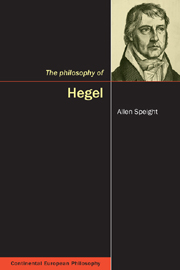Book contents
- Frontmatter
- Contents
- Acknowledgements
- Abbreviations
- Introduction
- 1 German Idealism and the young Hegel
- 2 The Phenomenology of Spirit
- 3 The Logic and Hegel's system
- 4 Ethics and politics
- 5 Hegel and the narrative task of history
- 6 Art, aesthetics and literary theory
- 7 Religion and philosophy
- Notes
- Guide to further reading
- Bibliography
- Index
2 - The Phenomenology of Spirit
- Frontmatter
- Contents
- Acknowledgements
- Abbreviations
- Introduction
- 1 German Idealism and the young Hegel
- 2 The Phenomenology of Spirit
- 3 The Logic and Hegel's system
- 4 Ethics and politics
- 5 Hegel and the narrative task of history
- 6 Art, aesthetics and literary theory
- 7 Religion and philosophy
- Notes
- Guide to further reading
- Bibliography
- Index
Summary
The Phenomenology of Spirit (Phenomenology; PhS) is at once one of the strangest and most fascinating of philosophical works. Its uniqueness has much to do with the union of two philosophical capabilities that do not always fall together in a single work or philosopher: a genuinely sympathetic philosophical imagination for what the experience of various “forms of life” – Hegel's word is “shapes of consciousness” – might be like (the “phenomenological” side of Hegel's project) and a speculative rigour concerned with what would be required for the enterprise of philosophy to become in a genuine way “science” (and hence for a critique of all the modes of finite knowledge that lead to what Hegel will call “absolute knowing”).
The marriage of phenomenological and speculative philosophical abilities is part of what makes for the extraordinary relation between form and content that characterizes the work. Most strikingly for its narrative structure, there is a constant tension between two perspectives: the experience of any given shape and the “we” who is doing the narrating and knows how that experience will turn out. The progress of the whole is thus an essentially re-enacted or “recollected” engagement – one that has its own distinct shape but which emerges nonetheless from an encounter with important (historical, literary, religious and philosophical) forms of predecessor narrative.
But coming to understand what Hegel's project in the Phenomenology is, is not so easy.
- Type
- Chapter
- Information
- The Philosophy of Hegel , pp. 27 - 50Publisher: Acumen PublishingPrint publication year: 2008

